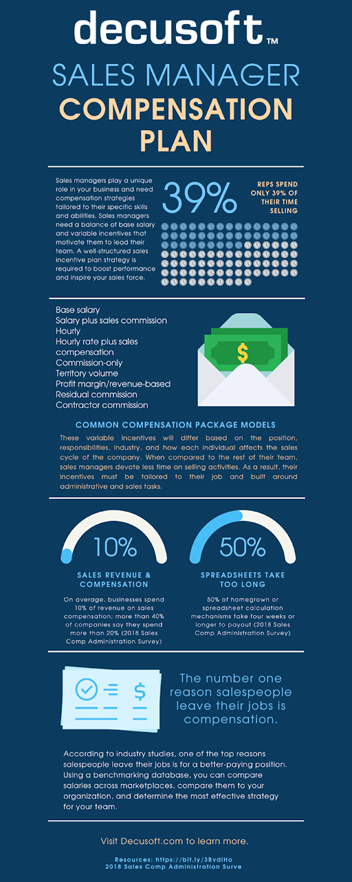Sales managers play a unique role in your business and need compensation strategies tailored to their specific skills and abilities. Sales managers need a balance of base salary and variable incentives that motivate them to lead their team. A well-structured sales incentive plan strategy is required to boost performance and inspire your sales force.
What Is a Commission?
A commission is a monetary payment usually given to a sales team depending on the volume, revenue, or level of performance they meet in a predetermined amount of time. The commission rate paid out depends on the industry, company, seniority, and type of services or goods provided.
What Is a Sales Compensation Plan?
There are two primary components of a compensation plan for sales teams. These include fixed base pay and discretionary incentive compensation. Base pay is what you usually think of when you look at your paycheck. Discretionary compensation incentives can include bonuses, benefits, and other monetary incentives that help motivate employees.
When you use sales incentives as part of your incentive compensation package, you can tailor these plans to meet your needs. Use goals and enticing incentives to inspire success within your sales team and drive top performers.
Strategic Incentive Compensation Plan
A well-defined compensation strategy is essential for motivating your sales team. Creating effective incentives for sales managers can be difficult. Because sales managers spend less time chasing down leads and closing deals than other sales associates, they require a commission structure that reflects their essential role.
Common Compensation Package Models
Base salary
Salary plus sales commission
Hourly
Hourly rate plus sales compensation
Commission-only
Territory volume
Profit margin/revenue-based
Residual commission
Contractor commission
These variable incentives will vary depending on the job, responsibilities, industry, and how each person influences the organization’s sales cycle. Your compensation team will need to develop a pay mix of basic income and variable incentives to drive salespeople to close deals and increase gross margins. Sales managers spend less time on selling activities than the rest of their team. As a result, their incentives must be suited to their position and carefully designed around administrative and selling responsibilities.
Creating incentives for managers might be complex. Read on to find the sales manager compensation plan best suited for your organization. You can also find out more about individual vs. team incentives here.
Increasing Sales Manager Commissions
Sales managers should be evaluated based on the success of their teams, base sales numbers, and any other metrics relating to their managerial obligations. This alignment of pay and performance ensures that sales managers are helping to guide their team and their organization towards success.
Sales Manager Pay Mix
Managers’ compensation packages are generally less aggressive than those of the salespeople who report to them since they have additional administrative obligations. As a result, manager compensation will be based on a more significant base wage with a lower share of variable incentives.
Sales managers are well-versed in the various responsibilities of your team and how they affect the sales cycle. They’re your sellers’ primary advocates since they’ve likely held one or more of those jobs in the past. Higher base salary reflects their knowledge, experience, and responsibilities, with a smaller proportion of their variable pay accounting for sales commission. Your sales managers’ pay should be based on their primary tasks, which include:
Sales performance coaching and training
Optimizing deals and opportunities
Monitoring overall team sales performance
Managing CRM data
Helping accelerate deals through the pipeline
Attracting and retaining team members
Long-term planning for sales reps and team performance
Sales Manager Commission Plan
Sales organizations that work on a commission-only basis are highly driven to close deals. Still, their work often comes with more tension due to the high level of risk involved, leading to sales burnout and lower retention overall.
When it’s necessary to use commission-only structures: Straight commission plans make the most sense in some cases, such as shortened sales times or a chance for large commissions and profitability, etc., although they are not widely used. For more information, check out our whitepaper on utilizing compensation software to decrease mistakes while saving time and money.
Sales Commissions Benchmarking
There is no one-size-fits-all formula for establishing the proper sales commission rates. The optimum rate to pay salespeople is determined by several criteria, including the market, the salesperson’s role, the geographic location, etc. When looking for the proper commission rate, keep the following guidelines in mind:
According to industry studies, one of the top reasons salespeople leave their jobs is for a better-paying position. Using a benchmarking database, you can compare salaries across marketplaces, compare them to your organization, and determine the most effective strategy for your team. It’s best if you tailor incentives to certain sales positions. The responsibilities of each sales team member differ. The responsibilities of a client development representative differ from those of an enterprise account executive or a sales engineer. Their salary and commission agreements should reflect this.
Legal Compliance
It’s important to keep legal enforcement in mind while creating a compensation or incentive plan for your sales managers. Are you familiar with the local and national payroll codes? Your HR department will advise you on any legal issues as you construct your pay plan. More money would stay in the payout pool and out of the hands of regulating bodies if costly fines were avoided.
Sales manager compensation can be a complex topic to nail down. There are hundreds of elements to examine and numerous performance indicators to assess when creating a comprehensive sales manager commission plan. Appropriate sales commission compensation might be the difference between long-term success and a string of disappointments and underperformance for a firm.
Compensation Analysis
Our Reporting & Analytics tools have been entirely revamped at Compose. We changed how the process works, what it can do, how it presents information, and most significantly, we placed you in charge of it all. We’ve built a self-service reporting dashboard that’s fully functional, fully configurable, and entirely dynamic. Pay is a company’s most significant expenditure, and all organizations require research and reporting on how compensation money is spent and incentivizing people in the correct ways. There is no one-size-fits-all approach to reporting in our industry. Our objective was to provide our clients with the tools they needed to build bespoke reports quickly.
DecuSoft’s Compose will become an essential component of your compensation strategy. The dashboard is simple to use, role-specific and can be seen with the Comp Grid. It also updates in real-time. Across the compensation cycle, planners, managers, human resource management experts, and compensation analyst teams can all see up-to-date statistics without having to refresh and disseminate the information themselves – all from one system. DecuSoft is what your compensation analysis team needs right now.





